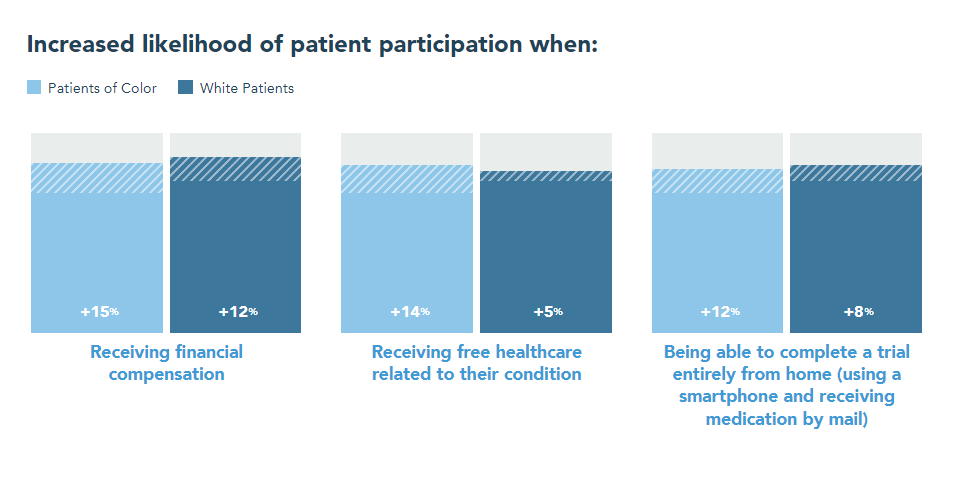
What You Should Know:
– In a recent patient-centric survey, SubjectWell found that accommodations for all patients, including free treatment and study compensation, increase interest in clinical trial participation – particularly for patients of color.
– However, overall, using value-based messaging, adding education to the recruiting process and reducing friction to participation – are universally impactful, not just for diverse populations, and that certain barriers affected white patients and patients of color nearly the same.
Exploring Representation in Healthcare Using Patient-Centric Surveys
Minority populations are significantly underrepresented in clinical research. When comparing the FDA’s recent Drug Trial Snapshots data with US Census data, women, white patients, and older patients are shown to be overrepresented in clinical trials. Black patients make up just 8% and Hispanic patients 11% of trial participants — much lower than their general population representation of 13% and 19%, respectively.
To further understand this disparity, SubjectWell fielded a survey in August 2022 of 423 patients, looking specifically at how common barriers to participation in clinical trials impact patients’ interest. The survey included a representative participant pool of both patients of color and white patients, 55% and 45% respectively. The results revealed that both patient populations were likely to participate in a clinical trial, with 70% of patients of color likely and 76% of white patients being likely to participate.
The key findings from the survey are as follows:
– Simple accommodations boost clinical trial participation likelihood for all patients: Across the board, the survey found a boost in patients’ likelihood to participate in a clinical trial when certain accommodations were offered, when compared to baseline participation responses (70% for patients of color and 76% for white patients). The responses did not differ significantly between patients of color and white patients, suggesting that accommodations can create interest for patients of color as well as for white patients.
– Barriers lead to lower levels of interest in both white patients and patients of color – When presented with barriers to participation, there were lower levels of interest for both patients of color and white patients. However, certain barriers affected patients of color more than white patients, including taking time off work and paying for expenses related to trial participation.
– Household income does not significantly impact patients’ interest in clinical research: Given that the survey identified patient compensation as a significant motivator and self-payment of participation expenses as a significant barrier, we looked for a correlation between patients with lower incomes and impact on interest in participating in a clinical trial. However, despite financial factors being both highly motivating and providing clear challenges, the survey data showed that there was no major difference in interest in clinical trial participation across income brackets. Even when considering factors like race and perceived cost of living, patients showed similar amounts of interest regardless of income.
